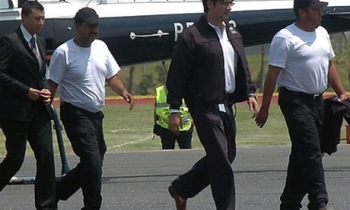NEW YORK (AdAge.com) -- Richard D. Parsons, chairman-CEO of Time Warner, today told a gathering here of media mavens and politicos that although he could not make the Time Warner-America Online merger work, he still feels the convergence of traditional media and the Internet is inevitable.
"We are the only media company with a major stake in the Internet," Mr. Parsons said. But talks are in early stages with competitors to sell off a stake in AOL, he acknowledged. Microsoft, Yahoo and a partnership of Google and Comcast have expressed interest in buying or partnering with AOL in recent weeks.
Mr. Parsons made his comments this morning at a breakfast at Syracuse University’s Newhouse School in Manhattan, where he was interviewed by New Yorker media columnist Ken Auletta. The breakfast was held in the Bryant Park Grille, which was brimming with political celebrities, including former New York state Gov. Mario Cuomo and former New York Mayor Ed Koch, as well as media luminaries.
Under pressure
Mr. Parsons is under pressure by Time Warner activist shareholder Carl Icahn to jettison AOL and the company’s cable business. On Nov. 2, the company announced during its third-quarter earnings report it had authorized a $7.5 billion increase in stock repurchase program to a total of $12.5 billion over the next 21 months, sending Time Warner’s shares up 2%.
Blaming Time Warner’s longtime poor stock price on a combination of the decline of mature (read: traditional) media and the disintermediation of new media, Mr. Parsons said, "We’re already on a path to [do what Mr. Icahn wants], but we’re doing it more slowly than he would like."
The tenor of Mr. Parsons’ remarks suggested that perhaps it wouldn’t be necessary to sell AOL after all. At the very least, he admitted that Time Warner would like to retain some control over the division even if a deal goes through. "We want to help our other companies to take advantage of the Internet and it would be easier if we retained part of AOL after a deal goes through," he said.
Ad model
When asked if the future of AOL is in advertising or subscriptions, he said, "Clearly, the exciting place is growth of the advertising business. Having said that, I wouldn’t dismiss the subscription business altogether."
Mr. Auletta asked Mr. Parsons if he could envision growing the 20 million membership base. "I can," he said, if AOL worked with a DSL or broadband partner. "[If we could] migrate ourselves into another subscription business by next year or the year after."
"Broadband is the exciting growth business. That’s where the audience is," he said. But the underlying business goal is to transition AOL into an audience-based business, he emphasized.
Mr. Auletta also asked if Mr. Parsons could ever see CNN again sitting atop the cable news market, after conceding the top spot to Fox News. Mr. Parsons said he could, but that beyond Fox’s superior ratings, the overriding criteria he has for CNN’s success is that it’s "still the most profitable because it gets premium CPMs [cost perthousand viewers]," thanks to the kind of audience it draws. An in was surely an underhanded shot at Fox News, he added: "I’m more confident with CNN’s product as a news organization than I am with anyone else’s."
CNN's role
He also went on to surmise CNN will play a role in the future of broadcast network news, capturing the news and then feeding a "white label" product to others. His suggestion feeds the rumors that CNN could merge with CBS, something that surfaced in June 2003 when Viacom’s then-president, Mel Karmazin, offered to by CNN but was rejected by Time Warner. At a Goldman Sachs media event this fall, Viacom Co-President and Co-Chief Operating Officer Leslie Moonves, soon to head the publically traded CBS Corp., said: "If Parsons wanted to sell it, we'd still be interested in buying CNN."
Time Warner is the biggest media company in the world, Mr. Auletta said, before asking Mr. Parsons what is missing from his quiver.
"Wireless and games," Mr. Parsons said. "Games online and computer games are becoming a huge, huge business, with young males [ages] 18 to 35."
Time Warner is already moving on the wireless front. Time Warner Cable yesterday joined Comcast, Cox and Brighthouse, the cable arm of Advance/Newhouse, in a wireless-cable venture with Sprint Nextel to develop a way for consumers to watch cable TV through their cellphones.
He added that in both the wireless and games arena, Time Warner is "making inroads" into possible acquisitions or some other deal, but he has nothing specific to announce. Overall, the company’s future lies in global expansion "and the Internet."









